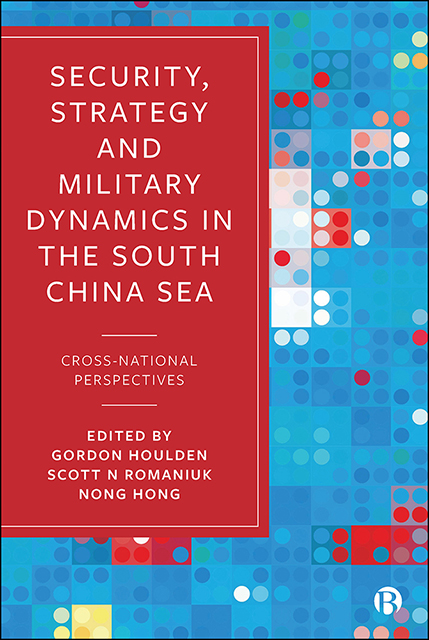Book contents
- Frontmatter
- Contents
- List of Tables
- Notes on Contributors
- Foreword
- Introduction: Strategic Challenges and Escalating Power Rivalry in the South China Sea
- 1 Between Competition and War: Complex Security Overlay and the South China Sea
- 2 The South China Sea as an Echo Chamber of Chinese Foreign and Security Policy
- Part I Claimants of the Contested South China Sea
- Part II Non-Claimants in Southeast Asia
- Part III Quadrilateral Security Dialogue States
- Part IV Non-Claimants in Europe and Eurasia
- Conclusion: Looking over the Horizon – Prospects for Settlement of the South China Sea Dispute?
- Index
1 - Between Competition and War: Complex Security Overlay and the South China Sea
Published online by Cambridge University Press: 13 April 2023
- Frontmatter
- Contents
- List of Tables
- Notes on Contributors
- Foreword
- Introduction: Strategic Challenges and Escalating Power Rivalry in the South China Sea
- 1 Between Competition and War: Complex Security Overlay and the South China Sea
- 2 The South China Sea as an Echo Chamber of Chinese Foreign and Security Policy
- Part I Claimants of the Contested South China Sea
- Part II Non-Claimants in Southeast Asia
- Part III Quadrilateral Security Dialogue States
- Part IV Non-Claimants in Europe and Eurasia
- Conclusion: Looking over the Horizon – Prospects for Settlement of the South China Sea Dispute?
- Index
Summary
Introduction
The South China Sea (SCS) has become the setting of one of the most intensive territorial and resource disputes in history. A myriad of small and medium states, together with the two greatest economic and military powers in the contemporary period, have laid claim to and contest states’ alternative claims to large sections of the SCS. China, as a revisionist power, has made the most sweeping claim of all states, designating nearly the entire sea as its own. In addition to its extensive resources, the SCS is a vital strategic waterway and a strategic locale critical for future power projection by existing great and rising powers. This chapter unpacks the central components of the conflict in the SCS that has been steadily intensifying since states began staking claims over islands and zones within the SCS in the 1970s. In doing so, we refer to the SCS as a “system of systems” involving multi-dimensional security overlay based on political, economic, and military interests as well as power projections. We argue that the central challenge facing would-be defenders of the status quo is their decentralized organization, with the US, the Philippines, and Vietnam intersecting in various subsystems though not forming a cohesive cooperative security system with a unified, cohesive purpose. Concurrently, China has seen much more success in marshalling a coherent, focused (Sinocentrist) stratagem for its salami-slicing approach in the region, much to the detriment of the region's status quo actors, even in spite of internal competition and rivalry regarding China's grand strategy and geopolitical trajectory as a state.
Geography and national security in the South China Sea
Situated at the nexus of the Western Pacific and the Indian Ocean, the SCS is one of the world's busiest bodies of water. More than half of the world's yearly shipping by tonnage passes through the various straits – Malacca, Sunda, Lombok, and Makassar – that feed into the SCS, with more than six times as much oil passing through these straits each year than through the Suez Canal. Beyond its importance as a shipping hub, the SCS itself is resource rich, with fisheries that provide a large portion of the nutrition for the inhabitants of the states around it and plentiful, largely untapped, hydrocarbon deposits under the seabed.
- Type
- Chapter
- Information
- Security, Strategy, and Military Dynamics in the South China SeaCross-National Perspectives, pp. 7 - 30Publisher: Bristol University PressPrint publication year: 2021

